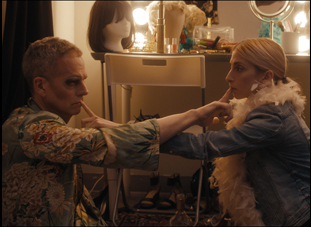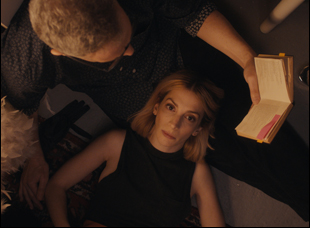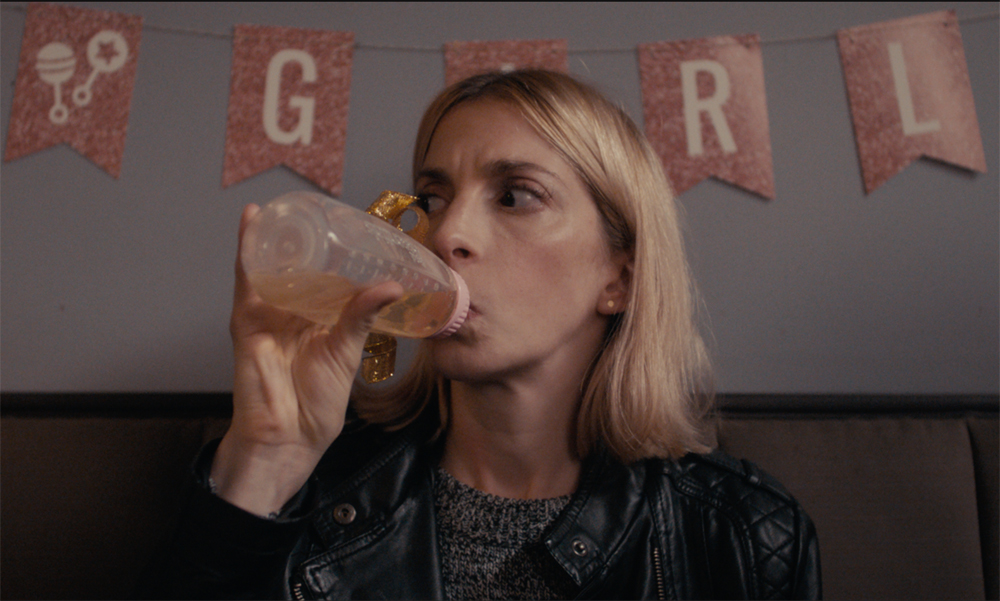As far as life-altering snap decisions go, the one made by Milo (Molly Bernard) early in “Milkwater” seems like a good one, realizing she’ll solve two problems in one if only she gives up nine months of her life to carry a baby to term. It wouldn’t be a commitment on her end, but rather gift to Roger (Patrick Breen), the owner of a drag bar she just met who has been long wanted a child of his own, yet has had the dispiriting experience of having two adoptions fall through and another surrogate situation fail to come to pass, while Milo needs something in her life to give it some purpose and taking attention away from the fact that all of her friends are moving in different directions than she is. However, what seems like a win-win at first gradually turns into something else in Morgan Ingrari’s considerate comedy when what she sees as the start of a new friendship with Roger begins to look more like a business transaction, threatening to make her feel abandoned once again when she gives up the baby.
What may not turn out to be such a great idea for Milo ends up serving as a strong one for Ingari, who finds both the humor and potential heartbreak in bringing together two people under the most intimate of circumstances yet whose relationship was never meant to extend past the due date. The first-time writer/director has made something surely more lasting as Milo and Roger adjust their expectations by coming around to each other’s perspective and with formidable turns from Bernard and Breen making it understandable why Milo may be confused that the two won’t be lifelong friends when both are so charming in each other’s company. A favorite at the Atlanta and Nashville Film Festivals where it premiered virtually, “Milkwater” is now arriving on VOD for the masses and the filmmaker graciously took the time to talk about what she learned from making her debut feature, shrewdly figuring out ways around budget limitations and how starting with an argument led to such an agreeable film.
I wrote this for a class in college, but it was very different. It was about a young woman who is a surrogate through an agency and then the couple that she’s a surrogate for dies unexpectedly and she has to decide what to do. I put the script away for a long time and wrote other movies, but the concept of surrogacy was always really compelling and when I started doing research about it, I realized that surrogacy contracts are quite ironclad. There’s ample legalese about what would happen in that situation, and I [thought], “I don’t really want to write a legal drama, but what’s an interesting angle on surrogacy?” At that point, I was seven, eight years older and I’d been living out in the world as a queer person for a while and I started thinking inevitably about how I would want to start a family, so I thought that was a much more interesting angle from a queer lens – two relative strangers who want the best thing but dive in headfirst without really considering all of the other complications.
When Molly and Patrick come into the picture, does it change your ideas of what this could be?
Definitely. Molly was our first cast, and I have a friend Lauren Ciaravalli, who’s a director in L.A. and worked as the script coordinator on “Transparent,” so she was there when Molly was playing the younger version of Judith Light’s character. When she read the script [for “Milkwater”], she said, “I think her star is on the rise, and she’s hugely talented and she’s a consummate professional,” so I started binging “Younger” and absolutely fell in love with her. I had written the character of Milo to be a little bit more middle finger in the air, and after watching Molly, I [thought] this is such a more interesting take on a character because she brings this endearing neuroticism to Milo and this deep empathy that was more complex than what we imagined.
Then we were casting the character of Roger against Molly, knowing that she was who we’d cast and Patrick just seemed perfect. They both have this anxious New Yorker energy and I thought they could hold up to one another without either character seeming like they were taking advantage of the other one or absolutely steamrolling the other one, which was important to me, so I got them in there and we got to do two days of rehearsal beforehand, which was absolutely amazing. We rewrote a couple of lines after they were cast and they performed beautifully opposite one another.

That is so funny [because] I am a huge reality TV show fan. I’ve auditioned for “Survivor” before, and I’m fascinated by that show in particular because of how clearly it’s cast for conflicting roles. You can tell how in their groove the casting department is on shows like that in knowing how to architect the greatest drama, so that’s definitely at work in my head, but in terms of going against type [in this film], I don’t know if it comes across as much, but I really wanted Ade Otukoya, who plays Cameron [a potential love interest for Milo], to really go against convention in that he’s a nice guy and Milo has this decent relationship with him, but really he’s there to provide an example of how she’s not really looking at her future. She’s weirdly focused on Roger, but I never wanted him to come across as the end-all, be-all, her one-and-only true love. He’s serving a role like female characters in romcoms do so often, but we don’t see from male characters, so I thought it would be neat to flip that.
I also often start with writing the argument because that’s always where I get my idea for the movie. In terms of foils, I always want to write arguments where either character could be right, so I’ll completely write the argument from one character’s perspective, as if they are correct in this argument, and then completely writing the other perspective in the argument as if that character is correct, so they’re inherently butting up against each other.
The neighborhood you create in this is so charming – it’s New York, obviously, but the best version of that. How did you build it from the city you had in front of you?
I’ve lived in Brooklyn for about nine years now and I’ve been in New York for probably 13, so it had to feel like to me what it actually feels like to live in New York, but locations were probably our biggest hurdle in preproduction. My producer Candice Kuwahara and I did all of this because we didn’t have a locations person and we were very low budget, so we went to a lot of bars and bought a lot of individual beers and we tried to sweet talk managers into letting us shoot there. Obviously, we didn’t have a budget to shut a bar down, so all of those bar scenes were shot 2 am to 2 pm, so it was definitely a lot of late nights for the crew, but maybe the sleepiness of the extras in the bar can [reflect the reality] of a dive bar scene in Brooklyn. [laughs]

Yeah, Robyn did end up being a very large portion of our budget. [laughs] I absolutely adore her and adore that song, but I wish I had known how expensive music licensing is going in as a first-time feature filmmaker. Obviously, it’s lip-synced [in a crucial scene], so we had to move forward with that song, even though I’m very glad that we did, but the rest of the music is our friends and people in our community. I think we licensed 27 songs in the end and it was a really long process — we just literally posted on Instagram and Facebook, but it was really fun being like, “Do you have any friends that play in a band? Would they like to send us music?” Then my dad is a musician and we play music together and we had one song in the film that had to be replaced because we couldn’t pay the licensing fee, but it’s kind of partially lip-synced, so my dad and I collaborated at the 11th hour to write a song that matched the tempo and lyrics that is completely different to put in, which was completely fun.
I had no idea. One of my other favorite things in the film is that the Anne Sexton poem “The Consecrating Mother” that you take the film’s title from is read in full and the blocking of that scene is really beautiful as Roger reads it to Milo. What was it like figuring that out?
To qualify for the New York State tax credit, you have to shoot one day on a studio lot and you have to put up flats — and it’s always going to be quite an expensive day because they know they can milk you for however much so they can qualify you for the tax credit, so we were thinking, “How do we do this?” I always knew I wanted that to be an overhead shot and once I had started talking with Candice and our [cinematographer] Maria Rusche, we realized there was no way we were going to get that shot in the actual bar [because] there’s no way to get a jib up high enough, so we [thought], “Maybe this is a good way to use our tax credit day.”
That was a shot I always had in my head and I’m the first to admit I’m not a deeply visual director, which is why I like to work with people that are better at it than I am. I also try to listen to feedback whenever I get it, but I wanted to keep the whole poem in and at every draft of the script, I’d get feedback that was like, “People are not going to watch a whole poem. Why are you spending three minutes of your movie doing this?” But I was like, “You know what? This is my movie and if I’m wrong, I’m wrong, but I think it’s one of the most beautiful scenes in the movie. Our production Cheyenne Ford built that dressing room on a studio backlot and we got to put a jib in there, and it’s one of the [scenes] I’m proudest of, just the technical capacity of the time it takes to get that perfectly is a testament to our crew and also Molly and Patrick.

Yeah, I’ve worked with some great people before, but this is my first feature and it was such a wild experience working with people that are as professional and talented as Molly and Patrick. Molly was in every single scene in the movie and she had to memorize 111 pages of lines and [still] she reacts in the moment to how the other character says their line and we’d get one take and it’d be like, “That’s exactly what I had in my head. I guess we get to play around with it now.” Which is pretty incredible. And she absolutely saved us in editing because she’s so expressive and very giving as an actor, so any time we needed to sell what the audience was supposed to be feeling in a scene or what Milo’s thinking, we had so much footage to cut to of Molly’s reactions, which is such a gift in an editing room. We had such a good experience with them and I feel so spoiled now in terms of the talent level of actors I work with.
You’re right there with them. When it’s your first feature, what’s it like having under your belt?
It definitely feels good. It’s a relief to know that I’m capable of doing it. I always I was, but making a movie is a big endeavor and you always worry you’re going to get there and realize this wasn’t what you were supposed to be doing, but I certainly feel proud of the movie we have and that I could do another one, which is great.
“Milkwater” is now available on Apple TV, Amazon Prime Video, FandangoNow, Google Play, VUDU and Wolfe on Demand.





